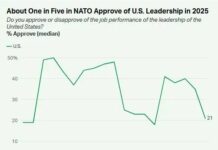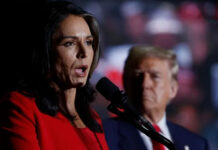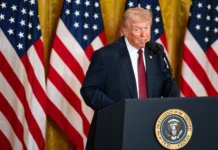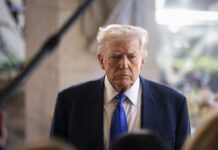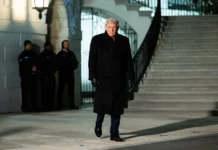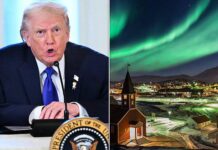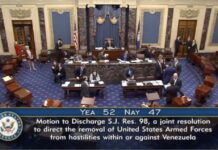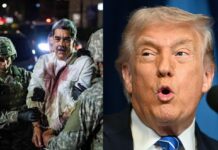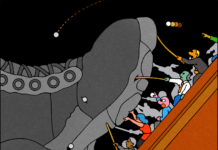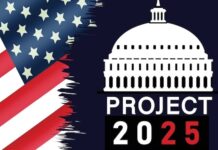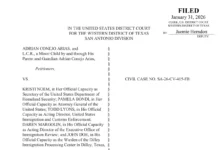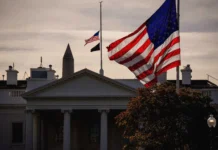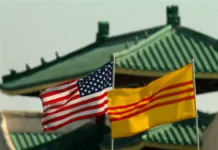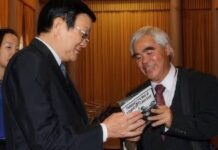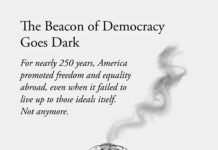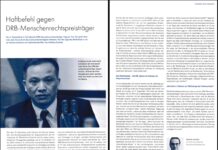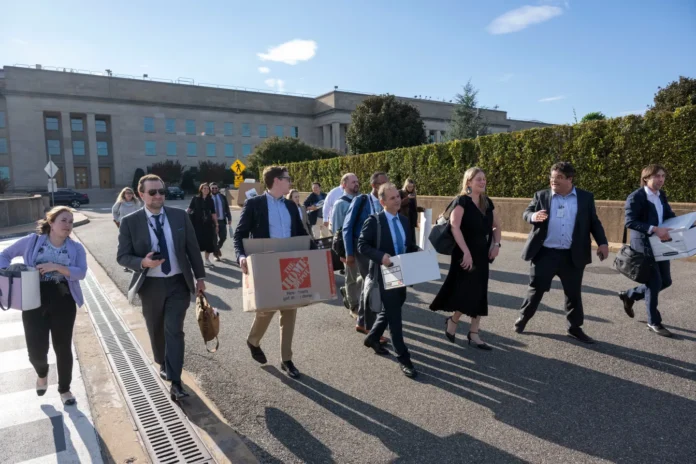
Dưới đây là bản dịch tiếng Anh toàn văn của bài “Sự vắng lặng ở Lầu Năm Góc: Cái giá của tự do báo chí” của Hà Giang (17/10/2025).
Tôi đã giữ nguyên giọng văn trầm tĩnh, sắc sảo và cảm xúc của bản gốc, đồng thời điều chỉnh cấu trúc để phù hợp với độc giả quốc tế (giới truyền thông, tổ chức nhân quyền, và viện nghiên cứu dân chủ).
By Ha Giang – October 17, 2025
October 15, 2025, has become another milestone in the long history of press freedom in the United States — a new crack in what once seemed to be the unshakable wall of democracy.
After a series of unsettling developments — from the shutdowns and defunding of RFA, VOA, and NPR — a new image has emerged that stunned the world: the once-bustling press corridor of the Pentagon has fallen silent.
That afternoon, more than thirty journalists from Reuters, Associated Press (AP), The New York Times, CNN, NBC, ABC, and even Fox News packed up their desks, turned in their press badges, and walked out of one of the most powerful buildings in America.
They were not expelled.
They left on their own — refusing to sign a new “Press Access Agreement” issued by Defense Secretary Pete Hegseth, a seemingly bureaucratic document that, in reality, marks a turning point in the relationship between the U.S. government and the free press.
A Gag Order Called “National Security”
Under the new rule, every news outlet seeking to maintain access to the Pentagon must sign a pledge to comply with “access provisions.”
The most controversial clause authorizes the Department of Defense to revoke credentials if a reporter “requests or collects information that has not been pre-approved,” even when the information is not classified.
From Secretary Hegseth’s point of view, it’s “a reasonable measure to ensure national security and informational order.”
But for journalists, it’s nothing less than a loyalty oath — a demand that they abandon their professional instinct: to ask questions and seek the truth.
When the signing deadline (4 p.m.) passed, reporters quietly packed their notebooks, photos, and laptops.
No slogans. No banners.
But in that silence was a declaration: We cannot do journalism if we are told what questions to ask.
Rows of cardboard boxes, empty chairs, darkened screens — one Reuters journalist described it as “a silent funeral for press freedom in the heart of the Pentagon.”
Nancy Youssef, a veteran Pentagon correspondent for The Atlantic who has covered defense for nearly two decades, called the policy “an invisible rope tying the hands of those whose duty is to observe power.”
She said bluntly:
“It’s absurd to ask journalists to sign a regulation that forbids them from seeking information from military officials.”
A Moment of Unity Amid Division
Almost every major outlet — Reuters, AP, The New York Times, NBC, ABC, CBS, CNN, and even Fox News — unanimously refused to sign.
Fox News’s stance was particularly striking, as it was once the professional home of Secretary Hegseth himself.
According to AP, Fox News joined ABC, CBS, NBC, and CNN in a joint statement rejecting the new rule:
“This policy is unprecedented and threatens the very foundation of press freedom.”
In a separate statement, Fox News reiterated:
“We will not accept any policy that undermines the freedom of the press.”
It was a rare moment of unity in a deeply divided media landscape — a shared defense of the right to ask questions, the right to report truthfully, and the right to practice journalism with integrity.
Amid that solidarity stood one exception: the small conservative channel OANN, which signed the agreement.
A minor decision — but a reminder that press freedom doesn’t vanish in a day; it erodes gradually, when compliance is mistaken for cooperation.
When Power Seeks to Control the Press
For centuries, journalism has been known as “the Fourth Estate,” standing alongside the legislative, executive, and judicial branches.
It commands no army, no budget — only one power: the right to question and reveal the truth.
Governments can make laws, courts can issue rulings — but only a free press can demand explanations, accountability, and transparency.
Without it, democracy loses its mirror.
The U.S. Constitution’s First Amendment famously declares:
“Congress shall make no law… abridging the freedom of speech, or of the press.”
The founders understood that when information is hidden, power escapes control.
The press was designed not as a mouthpiece of the state, but as its conscience — the independent force that compels those in power to face public scrutiny.
When power begins to steer the pen, the line between transparency and propaganda blurs.
What is happening at the Pentagon is not merely a procedural dispute over access; it is a test of America’s democratic resilience — whether journalists still have the right to question authority, or must simply echo it.
At a press briefing that same day, President Donald Trump, who appointed Hegseth, defended the policy:
“I think he believes the press is disruptive — an obstacle to world peace.”
He again labeled the media as “very dishonest.”
But observers noted that such words reveal a deeper trend: a government that no longer sees journalism as a watchdog — but as an adversary.
That evening, on Fox News Special Report, General Jack Keane — a longtime insider of the Pentagon — voiced his disapproval:
“They want to spoon-feed the press. But that’s not journalism. Journalism is about finding stories and verifying facts to prove what’s true.”
He added:
“No one can just walk up to a four-star general or a senior official. But I’ve seen reporters chase stories when something was happening inside the military — and that’s legitimate.”
And finally, he offered what sounded like advice to those still in power:
“See the press as your bridge to the American people. Some articles made me uncomfortable — but mostly because we weren’t doing our job as well as we should have.”
Those words rang like a warning bell: journalism only deserves to be called “the Fourth Estate” when it still stands where it belongs — facing power, not bowing to it.
When Truth Is Hidden
If freedom of the press is the right to speak, freedom of information is the right to know.
These two freedoms breathe the same air — and democracy cannot survive without both.
Since 1966, the Freedom of Information Act (FOIA) has compelled U.S. authorities to act transparently, affirming that information belongs not to the state, but to the people.
Through FOIA, countless documents have been declassified — from the Vietnam War to opaque defense contracts and public spending scandals.
But now, the government is quietly closing that door — not by rewriting the law, but by blocking access at the source.
When reporters are required to ask permission before asking questions, information flow is strangled before it even begins.
A journalist cannot file a FOIA request for a document they’re not even allowed to know exists.
When the right to ask is silenced, the right to know dies with it.
Citizens are left only with what the government chooses to tell them.
Freedom of the Press and Freedom of Information are twin rivers that feed the same sea — accountability.
When one is dammed, democracy begins to dry up.
The World Responds
The sight of journalists walking out of the Pentagon reverberated far beyond American borders.
Newsrooms and watchdog groups worldwide saw it as a troubling setback for global press freedom.
From London to Paris, Berlin to Sydney, international media are watching Washington with a mix of disbelief and concern.
- Reuters: “A blow to transparency and the independent journalism long seen as America’s pride.”
- The Guardian: “What’s unfolding in Washington marks the end of a press system once considered the gold standard.”
- Al Jazeera: “Control rarely begins with bans — it starts with rules that appear harmless.”
- Reporters Without Borders (RSF): “The Pentagon’s new policy sets a dangerous precedent for other nations.”
- Freedom of the Press Foundation: “This action contradicts the United States’ constitutional commitment to free expression.”
- National Press Club: “When the U.S. government limits access to the press, the world watches — and learns.”
From an Oath to a Question
Today, amid the empty desks in the Pentagon’s press hallway, I’ve come to understand more deeply what it means to be a journalist.
Journalism is not just a profession — it’s a choice: to stand with the truth, even if it means walking away from safety.
I wish I could have walked alongside those who left — carrying both pride and loneliness, guardians of a fading flame.
Because in that moment, they spoke for all of us: journalism does not exist to bow, but to illuminate.
I am reminded of a trip in 2011, when I spent two days aboard the USS Stennis to learn how the U.S. Navy operates.
Every morning, sailors — from recruits to commanding officers — stood together and recited:
“I will support and defend the Constitution of the United States of America… to defend freedom and democracy around the world.”
Yes — around the world.
Those words pierced my heart, as I thought of Vietnam, where so many continue to pay the price for the same ideals of freedom and democracy.
The events of October 15, 2025, kept me awake that night — reading, writing, filled with pride yet haunted by unease.
For every act of defiance by courageous journalists, I felt both admiration and sorrow.
And one urgent question kept echoing in my mind:
What is really happening to press freedom — and the freedom to know — in America today?
